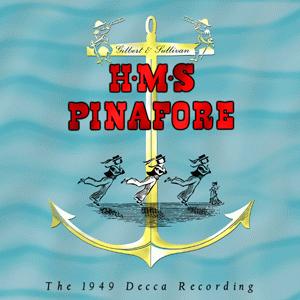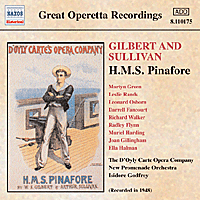The 1949 D'Oyly Carte Pinafore
D'Oyly Carte Opera Company
Recorded in London, |
|
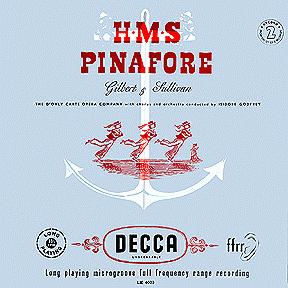 Decca LK-4002/3 |
Following closely on the 1949 Trial, this was the first full-length opera to be issued after the war, and the first issued on long-playing records. With the new technology having proved itself, the Company embarked on a prodigious recording schedule, which saw nine operas issued in a three-year period.
Compared with the 1960 Pinafore, which was issued with full dialogue, this recording inevitably comes out as an inferior choice. As on many recordings of the period, Leonard Osborn's tenor is a significant obstacle to the set's enjoyability.
David Sommerfield pointed out to me an ugly splice in the chorus tag of "A British tar." Clearly, this and other recordings of its time must have been recorded at great speed—"virtual run-throughs" as David calls them—as apparently they could not be bothered just to re-record the full number (as would undoubtedly be done today).
This recording enjoyed plenty of re-issues through the 1960s, and has been re-issued on Chris Webster's Sounds on CD label, Pearl, and Naxos. Chris tells me that he has cleaned up the splice problem referred to above, as well as other notorious sonic problems with this series. Perhaps the recordings of this era will finally be heard as the original artists intended them.
During the 1950's, Decca issued highlights of this recording (side 1), coupled with highlights of the 1953 Sorcerer (side 2). The items included were as follows:
- We sail the ocean blue
- Hail men-o'-war's men
- I'm called little Buttercup
- A maiden fair to see
- I am the Captain of the Pinafore
- I am the monarch of the sea
- When I was a lad
- Never mind the why and wherefore
- Pretty daughter of mine
- He is an Englishman!
- A many years ago
- Oh joy, oh rapture unforeseen
CD Review by Mel Moratti
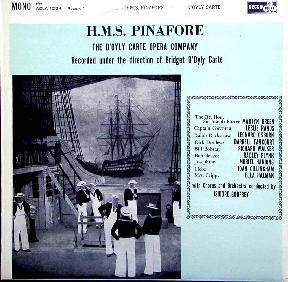 Decca Ace of Clubs ACLA 1054/5 |
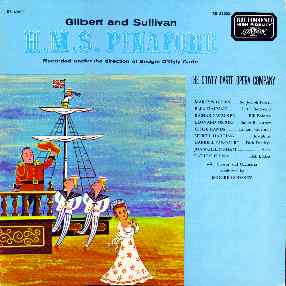 Richmond RS 62003 |
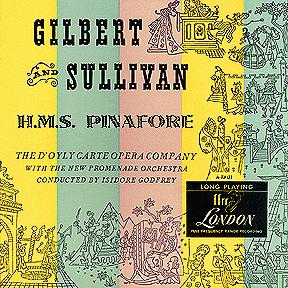 London A-4201 |
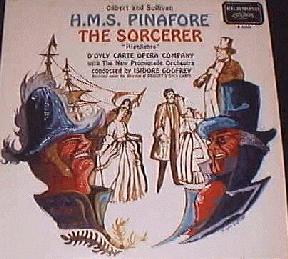 Richmond R23058 |
A copy has now come my way of the Pearl release of the 1949 H.M.S. Pinafore, and so this was a good chance to do a track by track comparison to the 'Sounds on CD' version which appeared a few months back.
The Pearl release was remastered by Roger Beardsley with notes by Marc Shepherd. Technical notes are by Mr Beardsley. The Sounds on CD release was remastered by Chris Webster with notes by David Steadman. Technical notes are by Jim Craig.
Although both CDs offer quite extensive technical notes, it is Mr Beardsley who writes the more in-depth details regarding all the recording and transfer problems of the time. Both CDs are riddled by extensive pre-echo, and it is interesting that in both instances attempts have been made to remove it — often in completely different places. One CD you may hear it — the other you may not.
This was a good opportunity to give these CDs the blind-fold test. Calling them CD 1 & 2, I jumped between both. I started with the Overture. Although both CDs had distortion at the opening, there was a nice warmth to the oboe solo on CD1 which just wasn't there on CD 2. However, on CD 2, at the 'Allegro Vivace', the sound brightened continuing on to the end.
Interestingly, between the Overture and the opening number, CD 1 had silence, while CD 2 retained the low frequency surface noise. This also happened later in the CDs. I personally preferred the surface noise, as you become acclimatised to it.
During the timpani entry of the opening chorus, there was a slight distortion on CD 1 which was not present on CD 2. When the chorus finally enters, it was obvious that CD 1 was producing a very different sound to CD 2. By the time Ella Halman makes her first appearance, I was listening to two completely different recordings. Both had their pluses and minuses.
CD 1 was the "Sounds on CD" recording. CD 2 was the "Pearl".
The SOCD recording made the soloists shine — they had a vibrant round sound that filled the room. The Pearl recording found them recessed. Some may prefer this as a more natural ambience — it especially suited the recording of the chorus. The chorus is probably the most disappointing aspect of the recording, and to have them 'forward' did not suit my tastes.
I found no fault with the solo recording on the SOCD disc — this certainly brought them out far brighter than I could ever imagine. "Hail men o'wars men" just sends shivers down the spine. The best way to sample the two recordings is the "My pain and my distress" sequence. The SOCD was as near to perfection you could wish for while the solo voices on the Pearl disc kept breaking up.
While I am not intending to review these performances from a musical aspect, listening to these CDs again made me appreciate just how good some of the soloists were. Darrell Fancourt is striking as Dick Deadeye, Ella Halman is a superb Buttercup, and Joan Gillingham is a prim and proper Hebe.
You could certainly live with both versions, but if I had to choose one it would be the "Sounds on CD" recording with its full-bodied sound and some crafty editing.
Chris Webster on Leonard Osborn's Vocal Difficulties
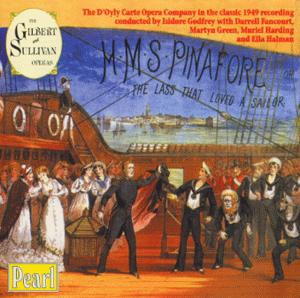 Pearl GEM0096 |
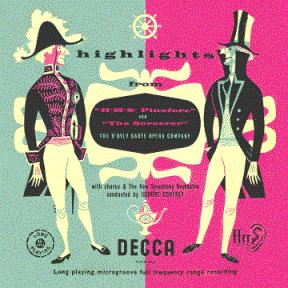 Decca LKA 4078 |
I have often cited Leonard Osborn as being one of the finest G&S tenors of all time, though it has to be said that he is in fine company with such legends as Tom Round, Derek Oldham, Philip Potter, etc.
However, it is fair to say that his greatest assets were probably in his characterisations and interpretations rather than his vocal prowess, and problems in this latter area on record often did him no favours, which I think is a great shame.
In particular, the 1949 Decca Pinafore recording shows Leonard experiencing difficulties in two passages of the act one finale — "expected" comes out rather flat and hooted in the "No, no, it's not to be expected" line; and there are various wobbles and cracks in "Be warned my messmates."
Both of these passages come from the same recorded section (the act one finale was recorded in two sections, and these lines are both from section one), but it is not well known that at least two takes were made of this passage, and Decca used a different take for the 78 (and EP) set to the one they used for the LP set.
Because the LP set had a much bigger and longer distribution, and it has also, so far, been the source for all of the CD issues (though I hope to, one day, prepare a CD of the 78 set), this 'bad' take is the one that has become well known. Today only a small number of collectors have copies of the good take and many of them probably aren't even aware that it is a different take.
I think Decca did Leonard a gross injustice by issuing such a dissatisfying take, and this still harms his reputation to this day, but with John Spartan's help (thanks, John) I am now able to redress the balance a little by putting online the less well known and vastly improved versions of these two lines from the alternative take, in which I think that Leonard is in magnificent, heroic voice. (I could have done this earlier by tagging this take onto the end of my CD issue, but the difference in sound quality between restored LPs and 78s would have been quite uncomfortable and distracting, though this is less important when the quality of the file is reduced anyway in order to make the file manageable for internet use.)
So, in one file you will find the two clips following each other, each of about 15 seconds length, to show how effective Leonard could be when he was in good voice. Visit this page and click on the picture to hear the file.
I hope lots of you will take the time to check this out. Leonard deserves it !!
Other CD Comments
Brendan Timins acquired the Pearl transfer, and he wrote:
I purchased H.M.S. Pinafore, and after listening to it, find it rather muddy sounding (perhaps due to over-CEDARing and adding too much reverberation?) in comparison with my old LPs.
It's not that I think Pearl's transfer is dreadful, it's just a shame it's not a clearer one. They've somehow made the recording sound older and murkier than it is. Green's "I am the monarch of the sea"/"When I was a lad" is one such example, which stands out in my mind. The sound is just lacking that bit of crispness and vibrancy. Again, I can only compare this CD to my old LPs. The booklet is very well done indeed, and it is one of the few Pearl booklets I've seen with a decent cover and a picture inside.
Robert Seletsky had this comment on the Naxos transfer:
Naxos 8.110175I just thought I'd let you know that, as the HMV in Cambridge was having a sale on Naxos, I was curious enough to get the post-war Pinafore and Mikado. I only opened the Pinafore, thinking that if I were to keep only one of these, it would be this, as it conveniently reduces four LP sides to one CD. Well, I will not be keeping even this. It's an utter abomination. One obvious thing that the bad reviews on your site never mentioned is that the engineer did such horrible things with the EQing that while it's largely too bright, somehow the very top octave is missing altogether, and the triangle, xylophone, cymbals are no longer there!! The listener who did not know the original sound would never be aware of this distortion because the overall sound is so bright and hard. How could anyone manage this and think it was okay. The Decca ffrr (full freq. range recording) of which they were so proud (and rightfully so) has been made into a pfrr (partial...). This has to be the worst CD transfer of anything I have ever had the displeasure of experiencing. I suggest that you mention this ghastly re-EQing on your site with a warning about this particular transfer. And one other thing that you might like to add to your site: the pitch is in outer space, much sharper—and hence the whole opera is about 5% faster—than the LPs. I checked with a tuning fork, and the LPs are correct. And again, "Ella Hallman" is credited. A disgrace. I can't even imagine what they did to Mikado, and don't want to find out.
| Date | Label | Format | Number | Comments |
|---|---|---|---|---|
| 1949 | Decca | 78rpm | AK 2261-8 | Automatic side couplings |
| London | 78rpm | T 5196/203 in Album LA-121 | ||
| 45rpm | 40013/20 in Album LGF-6 | |||
| Mono LP | LLP 71/72 XLLP 71/72 |
|||
| 1950 | Decca | Mono LP | LK 4002/3 | |
| LKA 4002/3 | Australian issue | |||
| ca. 1953 | London | Mono LP | LL 71/72 | |
| 1954 | Decca | Mono LP | LK 4078 | Pinafore and Sorcerer highlights. Note that LKA 4078 was an Australian issue. |
| LKA 4078 | ||||
| London | Mono LP | LL 809 | ||
| ca. 1956-7 | London | Mono LP | A-4201 | |
| 1957-8 | London | 45rpm | REP.8016 | Highlights |
| Late 1950s | London | Mono LP | 5091 | Pinafore and Sorcerer highlights |
| 1961 | Decca Ace of Clubs | Mono LP | ACL 1054/5 | |
| ACLA 1054/5 | Australian issue | |||
| 1960s | Richmond | Mono LP | RS 62003 | |
| R 23058 | Pinafore and Sorcerer highlights | |||
| ca. 1980 | Decca Viva | Mono LP | AUS 1010/1 | Australia/New Zealand issue |
| Cassette | KAUS 1010/1 | |||
| 1980s | Price-Less | Cassette | C 89207 | |
| 2000 | Sounds on CD | CD | VGS213 | |
| 2000 | Pearl | CD | GEM0096 | |
| 2001 | Naxos | CD | 8.110175 | |
| 2002 | Regis | CD | RRC 1088 | |
| 2004 | AVID | CD | AMBX138 | 10-CD set containing the entire nine-opera series recorded 1949–51, plus Pineapple Poll, the Overture ’Di Ballo’, and orchestral highlights (S. Robinson) from Pinafore and Yeomen |
| Side Nbr | Matrix Number |
Selection |
|---|---|---|
| 1 | AR13880-1A | Overture |
| 2 | AR13881-1A | We sail the ocean blue |
| 3 | AR13882-1A | But, tell me—who's the youth |
| 4 | AR13883-1A | My gallant crew, good morning |
| 5 | AR13884-1 | Sorry her lot |
| 6 | AR1388-1A | Gaily tripping |
| 7 | AR1386-1A | When I was a lad |
| 8 | AR13887-1A | A British tar |
| 9 | AR13888-1A | Can I survive this overbearing |
| 10 | AR13889-1A | This very night |
| 11 | AR13890-1A | Fair moon, to thee I sing |
| 12 | AR13891-1A | The hours creep on apace |
| 13 | AR13892-1A | Never mind the why and wherefore |
| 14 | AR13893-1 | Carefully on tiptoe stealing |
| 15 | AR13894-1 | In uttering a reprobation |
| 16 | AR13895-1A | A many years ago |
Note: For a discussion of the matrix numbers in this set, see the matrix numbers discussion page.
